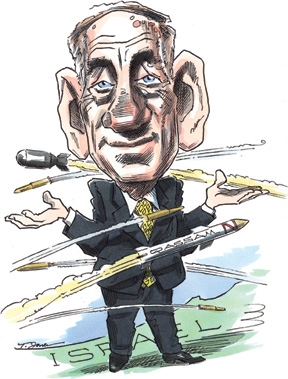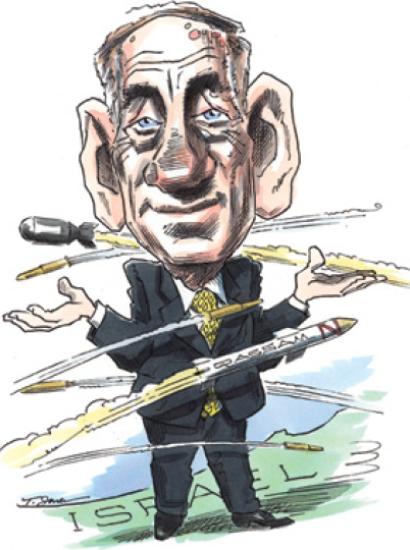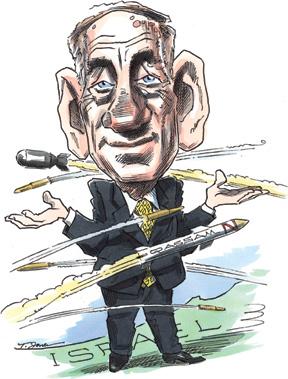- Contemporary
- International Affairs
- US Foreign Policy
- History
According to recent opinion polls, roughly 70 percent of Israelis—and about 70 percent of Palestinians—believe that two states living side by side in peace is the just solution to the conflict between them. Yet no solution is at hand. Indeed, a major address delivered by Prime Minister Ehud Olmert in January —and, even more, the political circumstances and climate of opinion in which he delivered it —dramatized the remoteness of any resolution. But it also highlighted Israel’s ability to prosper even as the Palestinians remain unable to establish a state of their own.
As their country marks its sixtieth birthday, Israelis face a formidable array of security threats. Weapons continue to flow from Egypt into the Gaza Strip; Hamas continues to rain Qassam rockets on the civilian residents of the Israeli town of Sderot, five miles northeast of Gaza, and on surrounding kibbutzim. In the West Bank, Israeli security forces operate around the clock to foil terrorist operations before they cross over into Israel. In southern Lebanon, Hezbollah has rearmed.
Slightly farther afield, satellite photographs show that Syria has begun to reconstruct what all the world believes to have been a nuclear facility destroyed by Israeli aircraft on September 6, 2007.
And then there is Iran. Israelis are unimpressed by the recent U.S. National Intelligence Estimate assertion that Tehran suspended its nuclear weapons program in 2003. They are more in harmony with the same document ’s assertion that Tehran proceeds apace in its efforts to produce enriched uranium —the crucial ingredient in nuclear weapons. Israelis believe that Iran is determined to become a nuclear power and that should it succeed, Tehran would present a grave danger to Israel, the region, and the international order.
As if those threats were not enough, Olmert acts and speaks from a position of weakness. His approval rating makes President Bush ’s look sterling. He suffers from prostate cancer. He has been subject to a prolonged investigation for graft. He labors under the widespread perception, bolstered by the Winograd Commission ’s preliminary report in April 2007 on the government’s conduct of the second Lebanon war, that Israel’s failure to inflict a crushing blow on Hezbollah was significantly due to his poor leadership.
So ask Israelis about the state of the nation, and they will tell you that things are grim and growing worse. But, observes political strategist Eyal Arad, chairman of the Euro Israel Group and former adviser to Prime Ministers Sharon and Olmert, ask Israelis about their personal prospects and many will tell you they have never had it better.
In fact, since recovering in 2003 from the second Intifada, the Israeli economy is booming, particularly in high tech. The stores are stocked with the latest European fashions and electronic gadgets from around the world. Newer, taller, more glistening buildings distinguish the Tel Aviv skyline. In addition, the health care system boasts excellent facilities, superb physicians, and universal coverage. Literature, music, theater, and filmmaking flourish. Radio and TV feature lively, loud, and nonstop discussion of issues great and small.
But it was Israelis’ despondency about their nation’s prospects, including apprehensions about their prime minister’s integrity and judgment, that Olmert sought to dispel in his January 23, 2008, address, the culminating event at the eighth annual Herzliya conference on Israel ’s national security.
While acknowledging mistakes, failures, and disappointments, Olmert insisted that the nation is sound, beginning with the eighteen months of peace that northern Israel had enjoyed since the end of the second Lebanon war —the longest such period in the twenty-five years since the launch of the first Lebanon war in 1982.
He confirmed that, thanks to Syria and Iran, Hezbollah had rearmed; it possesses not only more rockets and missiles but newer and more dangerous weapons today than on the eve of the 2006 war. Yet, insisted Olmert,
the unarguable fact is that the Hezbollah is not deployed along Israel’s border in the north; its fighters do not come into contact with our soldiers, and not one Hezbollah missile or rocket has been fired towards Israel for a year and a half. For the first time, the Lebanese army is deployed on the border with Israel. For the first time, there is an effective international force serving as a buffer between ourselves and the Hezbollah.
Moreover, from his government’s failures and mistakes, “lessons were learned, shortcomings were rectified, patterns of action were changed, ” Olmert said. Meanwhile, the quiet in northern Israel, he contended, reflects the re-establishment of deterrence, central to Israel ’s national security doctrine.
Concerning the war in the south, the prime minister stressed his full approval of Defense Minister Ehud Barak ’s decision to impose a partial blockade on Gaza. Although Israel would not allow “a humanitarian crisis to develop,” it would also not continue to supply all the energy Hamas needed to run a terrorist state:
We will not stop food for children, medicine for those in need or fuel for institutions tied to saving lives. However, there is no justification or basis to demand that we allow the residents of Gaza to live normal lives, while mortars are fired and missiles are launched from their streets and the courtyards of their homes towards Sderot and the communities in the South.
Israel, Olmert declared, would not relent in the fight against Hamas, either in Gaza or in the West Bank.

But at the core of Olmert’s speech was a commitment to the process the Bush administration launched at Annapolis. Despite the serious objections and genuine risks, there was, Olmert argued, no contradiction in taking advantage of a “historic opportunity” to achieve a political agreement with the Palestinians. He saw this opportunity in the combination of the “deserving Palestinian leadership” of President Mahmoud Abbas and Prime Minister Salam Fayyad, “a sympathetic international community,” and “an American president committed to the security of Israel and the unmistakable Jewish character of the country, at a level which is unprecedented in our history. ”
Many Israelis—and not a few well-informed Americans—believe that Olmert is engaged in a fool’s errand. There is a consensus among Israelis that the conditions for implementing a just solution to the conflict do not exist and are not likely to come into being any time soon. Despite the intentions of Abbas and Fayyad, Fatah is too corrupt; the Palestinian educational system is too poisonous; Jerusalem is too sensitive an issue; and Hamas is too appealing to too many Palestinians. Most important, any political agreement would require the Israeli army and internal security forces to leave the West Bank, but few in Israel believe that can be done without paying an intolerable price —exposing Tel Aviv and environs, the center of the country’s commercial life and home to half its citizens, to constant rocket attacks.
The unlikelihood of a political agreement with the Palestinians is to be regretted, but it is by no means cause for despair. Chastened by forty years of occupation and committed to a two-state solution the moment circumstances permit, a significant majority of Israelis are more than ready to continue to orient their economy globally and to contain the Palestinians without solving the conflict that divides them. This builds on the consensus forged by Prime Minister Ariel Sharon in the wake of the second Intifada.
As part of this view, an important segment of the Israeli right now repudiates the dream of an Israel that stretches from the Mediterranean to the Jordan River, and significant segments of the left are abandoning the conviction that Israel is at fault for all the pathologies of Palestinian society and could correct them, if only its heart were in the right place.
Because it faces up to harsh realities without losing sight of the demands of justice, the evolving consensus reflects the strength of the nation.
















